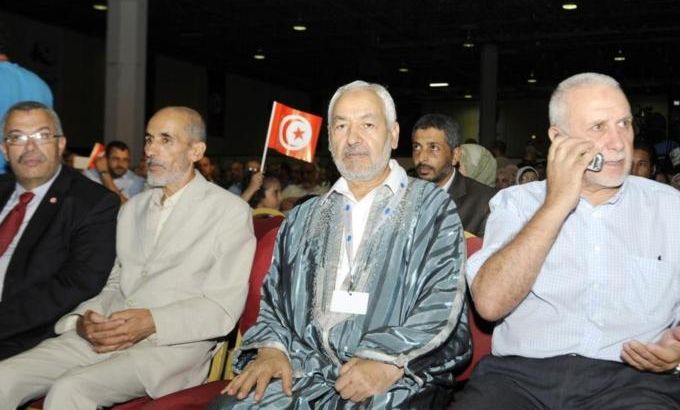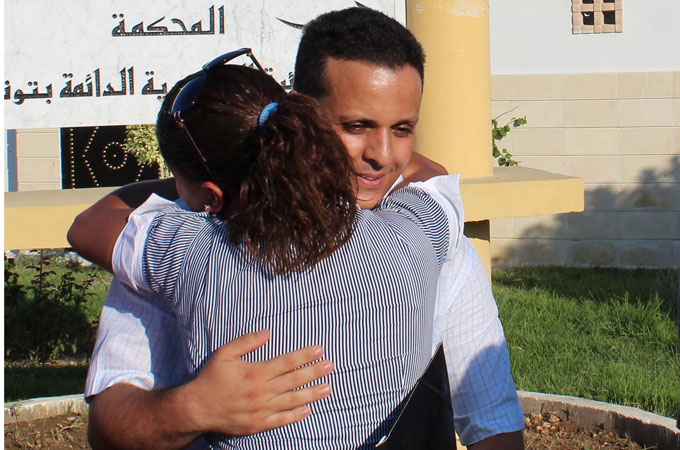‘Repression’ creeps back in Tunisia
Tunisia’s powerful ruling party has been accused of targeting opponents with criminal charges amid growing protests.

Tunis, Tunisia – Political turmoil has resurfaced in Tunisia, the country where the Arab Spring first began. After the ouster of former president Zine El Abidine Ben Ali, many took inspiration from social movements in the North African state.
Today, critics say some of the repression of the past has resurfaced, with courts accused of targeting opponents of the dominant political party in the coalition government, Ennahdha.
“After the revolution, we thought that political trials had become part of the past,” said Naziha Rajiba, a veteran Tunisian journalist who has shifted her critical focus from Ben Ali’s regime to Tunisia’s new rulers. “But since Ennahdha came to power, I started having doubts.”
Rajiba highlighted the case of Ayoub Messaoudi, a former member of President Moncef Marzouki’s cabinet. On August 30, Messaoudi arrived in court in Tunis to face charges of defamation and “denigration of the army”, after accusing Prime Minister Hamadi Jebali and two military officials of treason. Messaoudi could be put behind bars for five years if convicted.
“Ennahdha wants to discourage me from contesting their decisions,” Messaoudi told Al Jazeera. “They are afraid of what I may know about the troika [Tunisia’s governing coalition]. They don’t want me to disclose any unwanted information about them, their political allies, and the way they run the country.
“My case is not an exception,” he said. “Ennahdha is using all the exceptional measures available to stop people from talking.”
Messaoudi’s case is the latest feud within Tunisia’s new, post-Ben Ali political arena. The summer has been marked by controversy surrounding the actions of the Ennahdha, a party which believes Islamic principles should govern many aspects of family and political life, pushing increasing numbers of secularists and liberals onto the streets across the country.
“We are either building a democracy or setting the path for a dictatorship – we can’t just sit in between,” Abdennaceur Laouini, Messaoudi’s lawyer and a prominant human rights advocate, said. “We are either heading for one or the other.”
‘Who is going to be next?’
Courts are now being used across Tunisia by the government to pressure other dissidents – unionists, journalists, artists and comedians – who fear the political trials are part of a wider government campaign of repression.
In June, a member of the Tunisian General Labour Union was accused of inciting the public to murder. He was arrested.
Adnene Hajji was later found not guilty. In July, the government jailed unionists occupying a hospital in protest of the unilateral appointment of a new director.
Later that month, Ennahdha supporters and religious fundamentalists kept Lofti Abdelli from preforming his controversial comedy show 100% Hilal in Tunis. Two journalists were arrested in Kelibia for “harming public morals” in August over a critical story about Ennahdha.
Sami Fehri, who owns the Ettounissia TV station, had his popular satirical puppet show taken off the air in August. After accusing Fehri of corruption, the government issued an arrest warrant and he turned himself in on August 30.
The United Nations and Reporters Without Borders have criticised the government’s charges.
|
“The situation in Tunisia is still in transition – we are trying to build the second republic. I can ensure you that there is a strong will to keep a consensus and protect freedoms.” -Zoubeir Choudi, Ennahdha party official |
According to Amnesty International, free speech has been “repeatedly” stifled in Tunisia since June 2011. The human rights advocacy group singled out the Tunisian Penal Code’s Article 21, written by Ennahdha, “which criminalises the distribution of printed material that disrupts public order or public morals”.
Ennahdha member Zoubeir Choudi said political mistakes are unavoidable in the chaotic early stages of democracy.
“The situation in Tunisia is still in transition. We are trying to build the second republic,” said Choudi, who oversees the office of Ennahdha’s leader Rachid Ghannochi.
“There is a strong will to keep a consensus and protect freedoms. Ennahdha is committed to … its promises. But no one is perfect and decisions are only an estimation of what is right to do. Sometimes this estimation is wrong,” Choudi said.
Others are not so sure. Sadok Ben Mhenni, a rights activist who was incarcerated for four years under Ben Ali, said the political persecution of former cabinet minister Messaoudi is part of a larger trend.
“Ayoub is just a link in a whole chain of actions that the authorities are undertaking, actions which target the freedom of expression,” said Mhenni.
Rising tensions
Mhenni and others have rallied recently to protest a myriad of government policies, including Article 21, the draft constitution’s article defining women’s role in society, violent crackdowns on demonstrations, and the appointments of government loyalists to head a media agency and a hospital. Protests have erupted against Ennahdha in the capital, Tunis, and beyond.
 |
| Politician Ayoub Messaoudi [Sofiene Addala/Al Jazeera] |
Tension has been rising in the town of Sidi Bouzid where Mohammad Bouazizi self-immolated – the event that sparked the revolt against Ben Ali, as well as the 2011 Arab Spring.
Messaoudi’s sister Rifka said his trial was “linked” to the town.
“My brother’s statements [against the military] were quite serious,” she said. “But on the other hand, the charges against my brother were pressed only after his recent support of anti-government protests in Sidi Bouzid. Such a coincidence is really intriguing.”
The tensions have pushed activists and parties together, even if all they share is the single goal of unseating Jebali’s government. Feminists, trade unionists, human rights advocates, and secularists are organising against what they fear is Ennahdha’s drift toward authoritarianism.
“I don’t support Messaoudi as a person or as an event. I am supporting my country and my citizenship,” Mhenni said. “One of the slogans today is: ‘Today was the turn of Ayoub, tomorrow who is going to be next?’”
Coalition could crumble
Tunisia’s district attorney has begun investigating the actions of General Karim Ammar in connection to Messaoudi’s case, according to Nadia Belghith, one of his lawyers. If the General is proven to have played a direct role in the persecution of his critic, the military court’s impartiality would be suspect. It has already violated a number of international legal covenants, according to Human Rights Watch.
“This will not keep me from talking,” Messaoudi said, after the military court adjourned on August 22. “People from different regions of the country are supporting me. People stood outside of the court for hours to show their support, under a hot sun. This gives me some strength to defend our cause, the cause of our country.”
Many Tunisians fear what Messaoudi’s and other similar cases mean for democracy in – none more than members of the country’s second-largest party, the Congress of the Republic (CPR).
President Moncef Marzouki’s centre-left party is an integral part of Ennahdha’s power-sharing coalition, but it has been rumoured to be weighing splitting from the government.
If it did, the coalition and the government’s authority would crumble.
|
“An irreversible gain of the revolution is that a good number of Tunisians started acting as real citizens who know their duties and who ask for their rights.“ – Sadok Ben Mhenni, rights activist |
On August 22, politicians gathered in the Palais du Congrès, filling the large hall to hear a speech by Marzouki that responded to the charges against Messaoudi, and the summer of rising civil tension.
“If the revolution brought out the best in us, with regret, it also brought out the worst in us,” he said during the speech.
Ennahdha’s Choudi defended the coalition’s unity blaming “some minor disagreements”, messy parliamentary politics, and an inadequate “mini-constitution” for the current turmoil.
Marzouki lamented the in-fighting of post-Ben Ali Tunisia, called on Tunisians to resist the pull toward authoritarianism, and compared the military and Ennahdha to the former autocratic president.
Others are less fatalistic about the state of Tunisia.
“An irreversible gain of the revolution is that a good number of Tunisians started acting as real citizens who know their duties and who ask for their rights,” Mhenni said.
Follow ST McNeil on Twitter: @STMcNeil